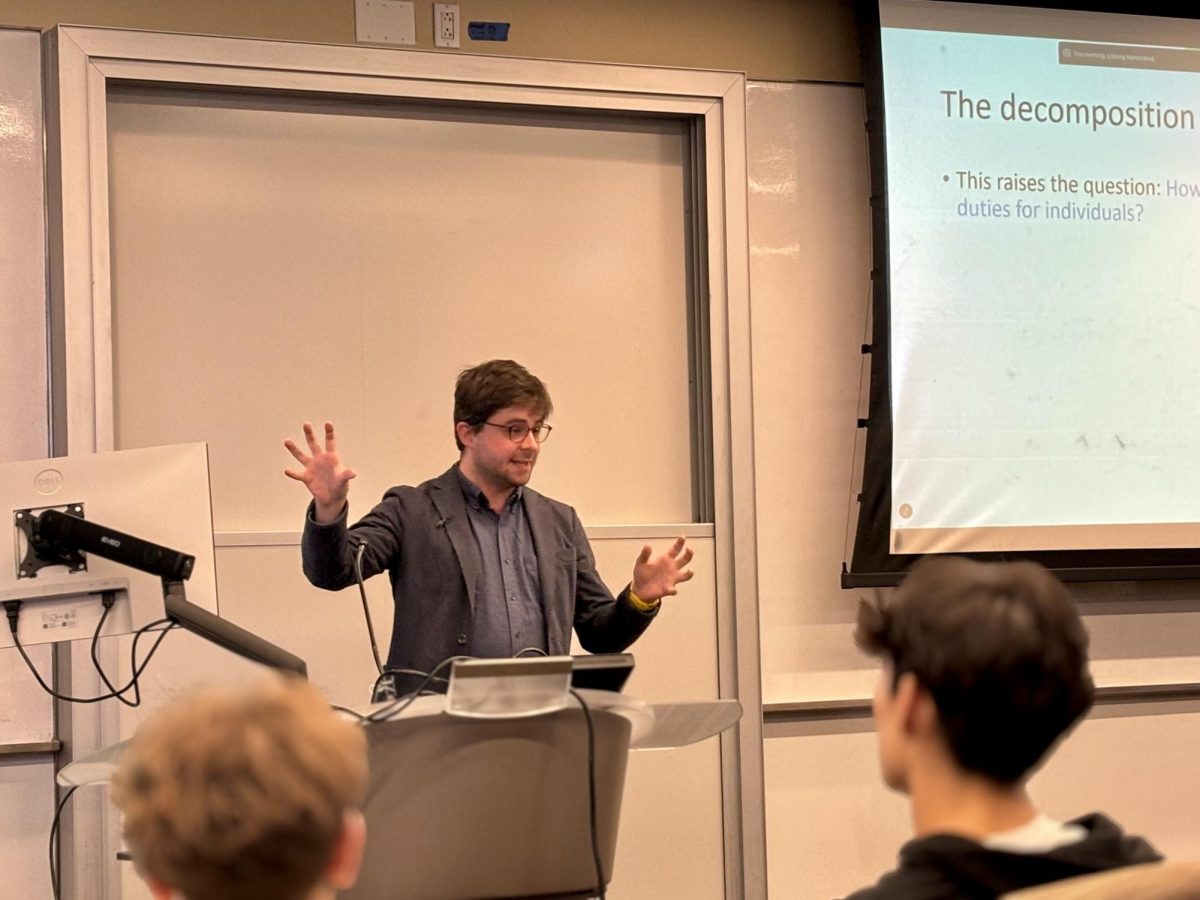The Fordham University Gabelli School of Business law and ethics area hosted guest speaker Dr. Samuel Mortimer in Hughes Hall on Oct. 25. Mortimer, a psychologist and philosopher with the Saïd School of Business at Oxford University, came to New York City to deliver a seminar on managerial morality and employee behavior in business, engaging Gabelli students and faculty in the discussion.
Mortimer is a specialist in the Oxford University Centre for Corporate Reputation and the Kyoto Institute of Philosophy. He holds a Ph.D. in ethics and legal studies from the Wharton School, University of Pennsylvania, and a Bachelor of Arts in philosophy and theology from the University of Oxford.
Mortimer’s lecture, titled “The Messy Ethics of Business Organization,” began with a description of how he understood business from a young age.
Being a professor in business ethics, Mortimer has spent much of his career attempting to identify the best possible morals for business leaders. “We look to leaders as the people who control what’s really going on and what is so important in our lives,” said Mortimer. He went on later to say that “organizations should not seek to exploit market failures.”
Mortimer noted that often managers are the ones who command control of the organization’s expectations, but noted that business ethics theories and organizations (SBEs) are not controlled by a single person: “My claim is that SBEs cannot be decomposed into ethical duties for individuals, given realistic and empirically supported assumptions about how business organizations function.”
Mortimer raised the question of whether or not managers control organizations. “If managers could control how the organization functioned, they would be able to make sure that the corporation achieved its ethical operations,” he said. He cited many philosophers who fall into a stance of thinking businesses operate under the control condition, noting an appearance of hierarchy and control of managers of the people below them.
Mortimer described a situation in wartime Japan, where the military followed the control condition. “The wartime Japanese military had the appearance of a strict hierarchy,” he said. “Managers’ control is limited by inertia, path dependencies and complex systems.” According to Mortimer, situations like this often shape people’s ideas of organizational hierarchy.
“Managerial commands often reflect subordinate influence, and complex companies need to generate information from other people,” said Mortimer. “These people have the ability to hide certain pieces of information but exaggerate other pieces of information. This gives those below the manager and executive power to affect what information is provided to the people above them.”
He expanded on this idea by analyzing what factors influence managerial decision-making. “Managerial power, to a large extent, is at the convenience of those who are governed,” said Mortimer. “They feel they can only say certain things because the people below them will accept them as reasonable things to say. Managerial commands are often things they know the people below them already want to do.”
Mortimer noted that most workers do feel some sense of control, which leads to people believing that managers control organizations. “Workers commonly feel controlled, and they perceive their managers as the source of that control,” said Mortimer. “But it is compatible to say that workers are extensively and minutely controlled, and managers are neither less controlled.”
“The organization is set up so that you can be replaced,” said Mortimer. He noted that organizations are not just constantly turning machines. “People can fail to follow the organization’s ‘commands,’ and thereby undermine its control, as much as they can a manager’s control… Organizations operate through mechanisms that produce effects over which humans have little intentional control.”
Mortimer shifted topics to discuss the knowledge condition. “Business practitioners, or businesspeople, face epistemic barriers to ethical reform,” said Mortimer. “If the organization is not already meeting its obligations, the issue is how to reform the organization.” He also raised a question on why it is so hard to have ethical reforms in organizations.
“Wrongdoing is often embedded in organizational processes and structures, these can be sources of inertia,” said Mortimer. “Even when the profitability and survival of businesses is on the line, they regularly fail to overcome inertia.”
Isabella Sill, GSB ’28, attended the lecture and said, “I found the lecture very interesting, as it gave me a different perspective to see how companies work as a bio-machine, rather than employees being simple ‘cogs’ in a machine.”











































































































































































































